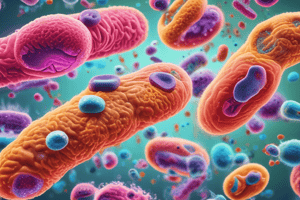Podcast
Questions and Answers
Which of the following is NOT a branch of microbiology?
Which of the following is NOT a branch of microbiology?
- Immunology
- Virology
- Bacteriology
- Meteorology (correct)
Microorganisms play a significant role in the production of which of the following nutrients?
Microorganisms play a significant role in the production of which of the following nutrients?
- Vitamin B (correct)
- Vitamin D
- Calcium
- Carbohydrates
What role does an epidemiologist perform in the field of microbiology?
What role does an epidemiologist perform in the field of microbiology?
- Provide patient care
- Monitor disease transmission (correct)
- Identify aetiological agents
- Conduct drug research
Which of the following statements about microorganisms is true?
Which of the following statements about microorganisms is true?
Which major discipline of microbiology focuses on the relationship between microbes and human health?
Which major discipline of microbiology focuses on the relationship between microbes and human health?
Which professional role in microbiology is responsible for guiding treatment and identifying disease causes?
Which professional role in microbiology is responsible for guiding treatment and identifying disease causes?
Microorganisms are beneficial in which of the following industries?
Microorganisms are beneficial in which of the following industries?
What is the study of parasites, including protozoa and helminths, called?
What is the study of parasites, including protozoa and helminths, called?
Flashcards
What is Microbiology?
What is Microbiology?
The study of microorganisms, including bacteria, viruses, fungi, and parasites.
What is Medical Microbiology?
What is Medical Microbiology?
A specialized branch of microbiology focused on the study of microorganisms in relation to human health.
Microorganisms and Environmental Impacts
Microorganisms and Environmental Impacts
Microorganisms are responsible for creating half of the earth's carbon and 90% of its nitrogen.
Bacteriology
Bacteriology
Signup and view all the flashcards
Virology
Virology
Signup and view all the flashcards
Mycology
Mycology
Signup and view all the flashcards
Parasitology
Parasitology
Signup and view all the flashcards
Immunology
Immunology
Signup and view all the flashcards
Study Notes
Introduction to Microbiology
- Microbiology is a specialized branch of biology focused on the study of microorganisms.
- Medical microbiology examines microorganisms in relation to humans.
- Microorganisms are found everywhere, from marine depths to human skin.
- Microorganisms are crucial to many natural processes, including producing carbon and nitrogen, biodegradation, digestion, and vitamin production.
Branches of Microbiology
- Bacteriology: Study of bacteria (including pathogenic bacteria).
- Virology: Study of viruses (affecting both plants and animals).
- Mycology: Study of fungi (like yeasts, molds, and mushrooms).
- Parasitology: Study of parasites (including protozoa, helminths, and insects).
- Immunology: Study of the body's defense mechanisms against infection and disease.
Major Disciplines of Microbiology
- Immunology
- Public Health microbiology and epidemiology
- Food, dairy & aquatic microbiology
- Biotechnology
- Gene Therapy
- Industrial Microbiology
- Agricultural Microbiology
Themes in Microbiology
- Basic microbiology: Examines microorganisms by organism, by process, and those related to disease:
- By organism: Bacteriology, Phycology, Mycology, Virology, Parasitology, Protozoalogy
- By process: Microbial metabolism, Microbial genetics
- Disease related: Immunology, Epidemiology, Etiology
- Applied microbiology: Focuses on disease-related issues, environmentally related concerns, and industrial applications:
- Disease related: Infection control, Chemotherapy
- Environmentally related: Environmental microbiology
- Industrial: Food & beverage technology, Pharmaceutical microbiology, Genetic Engineering
Benefits of Microbiology
- Food industry
- Environmental applications
- Agricultural advancements
- Energy production
- Wastewater treatment
Why Study Microbiology?
- Microbes are essential for health, nutrition, and environmental survival.
- They are the foundation of all life.
- They impact daily life in many ways.
- Only a small portion of microbes cause diseases.
- Microbes are practically everywhere.
Professional Roles in Microbiology
- Epidemiologist: Investigate and monitor disease transmission.
- Doctor: Examine disease manifestations, diagnose and treat.
- Pharmacist: Support disease treatment and drug research.
- Medical Technologist/Technician: Identify disease-causing agents.
- Nurse: Provide patient care, disease prevention, and education.
Homework 2 - Important Figures in Microbiology
- The table in the document provides information about key microbiologists (e.g., Louis Pasteur, Joseph Lister, Robert Koch, Alexander Fleming) and their contributions and time periods of work.
Studying That Suits You
Use AI to generate personalized quizzes and flashcards to suit your learning preferences.




